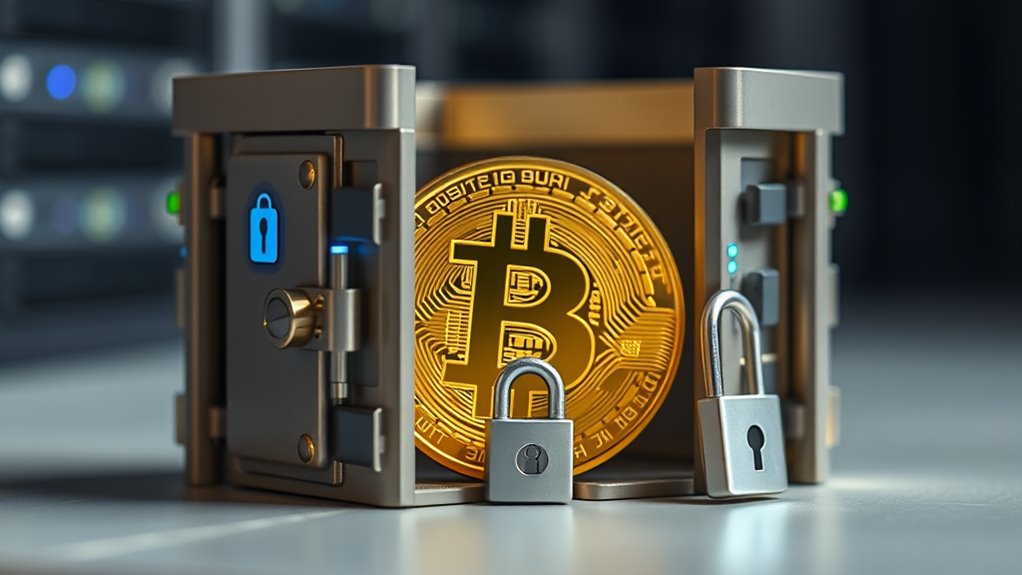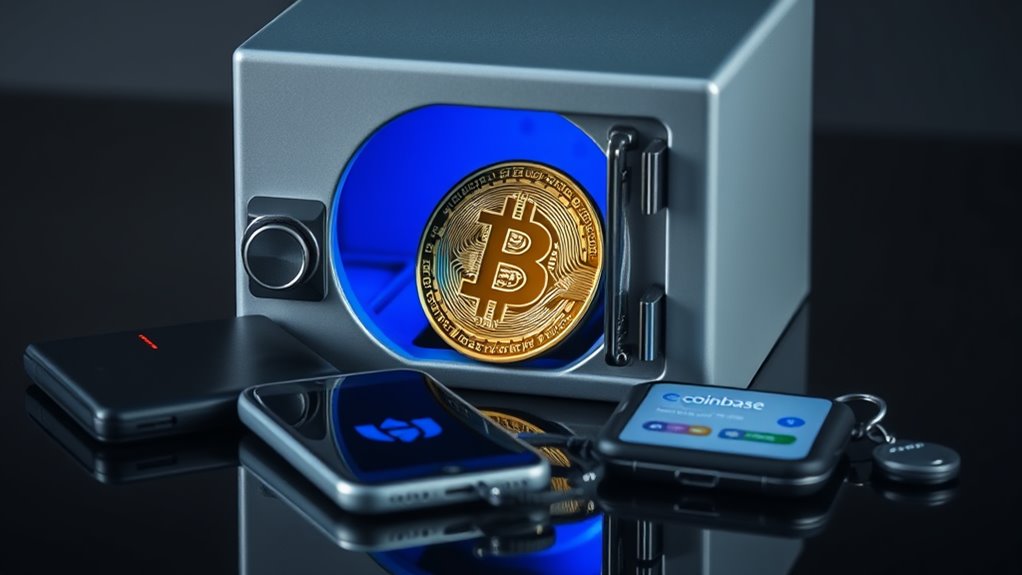Is Your Crypto Protected on Coinbase?
Note: This post may contain affiliate links, and we may earn a commission (with No additional cost for you) if you make a purchase via our link. See our disclosure for more info. The crypto world is constantly changing. This content is for informational purposes only and not financial, legal, or professional advice So, please verify the info on the cryptocurrency provider’s websites.
Coinbase takes your crypto security seriously. They've got FDIC insurance for USD balances—up to $250,000, so that's nice. Most of your assets? Locked away in cold storage. Like, 98% of them. They've got two-factor authentication and even biometric options. Oh, and they're monitoring your account 24/7. That's some serious commitment. So, rest easy, right? Well, there's always more to the story. Keep exploring to find out what else they're doing to keep your assets safe.

When it comes to crypto protection on Coinbase, it's not just about keeping things safe; it's about layering on security like it's the ultimate game of Tetris. The platform offers a hefty dose of protection for users' assets, starting with FDIC insurance that covers USD balances up to $250,000. That's right, if someone manages to snatch your cash, there's a safety net.
But it gets better. Coinbase employs AES-256 encryption, guaranteeing that data is locked down tight. Time-sensitive codes from authenticator apps provide an additional verification step when accessing your account.
Coinbase locks down your data with AES-256 encryption, ensuring it's as secure as Fort Knox.
Then there's cold storage. A whopping 98% of assets sit in cold storage, away from the prying eyes of hackers. The majority of user funds stored offline enhances security and adds another layer of protection. Multisig technology means multiple keys are required to access funds, adding another layer of security. Additionally, Coinbase implements two-factor authentication (2FA) for added login security to help prevent unauthorized access.
Biometric security? Of course. Because who wouldn't want their crypto locked behind a fingerprint or face scan? Internal monitoring keeps an eye on the action, too.
Regulatory compliance is a big deal, and Coinbase doesn't skimp on it. They play nice with the SEC and hold licenses in multiple regions, including the US and EU. It's like having a stamp of approval that says, "Hey, we're legit."
The Coinbase Wallet is a self-custody option, letting users control their own private keys. Secure Element chips and backup options guarantee that losing a key isn't the end of the world.
Transaction safeguards don't just stop at simple alerts. Token approval alerts and previews help users stay one step ahead of potential scams, while dapp blocklists keep unwanted apps at bay.
User authentication is another fortress. Two-factor authentication, device verification, and security prompts make certain that only the rightful owner can access their crypto.
With hot wallet insurance and 24/7 monitoring, Coinbase has an incident response plan in place. If something goes wrong, they're ready to act.
In the wild world of crypto, Coinbase offers a fortress of protections. But remember, it's still a jungle out there.
Frequently Asked Questions
What Happens if Coinbase Goes Bankrupt?
If Coinbase goes bankrupt, hold onto your hats.
User crypto could vanish into the bankruptcy abyss, classified as unsecured debt—good luck getting that back.
No FDIC insurance here, folks.
Remember Voyager? Users got crumbs.
Withdrawals made before bankruptcy? They might get yanked right back.
With no solid legal framework, it's a wild west scenario.
So, if you think your crypto is safe, think again.
It's a gamble, and the odds aren't great.
Can I Retrieve Lost or Stolen Crypto on Coinbase?
Retrieving lost or stolen crypto on Coinbase? Good luck with that.
They've got a recovery feature, but it's not a magic wand. You need a TXID and the right address—no guarantees here.
Sure, there's a self-service tool, but it won't save everything. Some assets just won't qualify, and there's a fee if your loss exceeds $100.
Does Coinbase Support Hardware Wallets?
Yes, Coinbase does support hardware wallets, specifically Ledger wallets. This means users can manage their private keys offline, away from the online dangers lurking out there.
But hold on—it's not all smooth sailing. You need to manually set things up through a browser extension, and the mobile app? Forget about it; it doesn't play nice with hardware wallets.
Are There Fees for Transferring Crypto Out of Coinbase?
When it comes to transferring crypto out of Coinbase, fees can vary. Expect to shell out $1-$5 for Bitcoin withdrawals.
Other coins? Usually under a buck. But hey, those fees can change based on network traffic.
And if you mistakenly send unsupported assets? Brace for a 5% recovery fee on anything over $100.
Just remember, recovery isn't guaranteed. So, make sure you double-check those addresses. It's a wild ride out there!
How Can I Increase My Account Security on Coinbase?
To boost security on Coinbase, one must take a few straightforward steps.
Strong passwords? A must. Use a password manager.
Two-factor authentication? Absolutely. Seriously, SMS isn't enough—get an authenticator app.
Monitoring activity is key; kick out any suspicious devices.
Phishing? That's a big no. Verify emails and avoid sharing sensitive info. Trust no one.
And for the love of crypto, bookmark the official site. It's all about keeping those digital coins safe!











One Comment